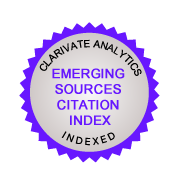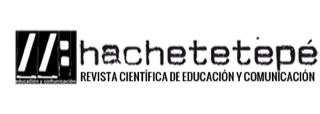Reflective practice in postgraduate teachers, understand to transform
DOI:
https://doi.org/10.24310/innoeduca.2018.v4i1.3594Keywords:
teacher education, reflexive professional, competence reflexiveAbstract
Each of the world forums of education from Jomtiem, Thailand (1990), to Incheon, Republic of Korea (2015), have a fundamental objective which is the improvement of the quality of education, which requires substantive changes in teacher education that produce a series of competences for its professionalization.
Professionalizing a teacher acquires a connotation of autonomy, expert knowledge and ability to build his own knowledge from his experience, a critical stance is assumed in the process of training and professionalisation where the development of a reflexive practice (RP), is required.
The purpose of this scientific article is to communicate the process and results of an action research, from the diagnosis, design and implementation of intervention that consisted of a workshop based on the paradigm of reflexive practice for postgraduate teachers and finally the results of the evaluation
The theoretical reference was framed in authors that have contributed in the conceptual, methodological and technical issue in the field of reflexive practice, like Philippe Perrenoud, Donald Shön, Christopher Day, Kolb, J. Elliot, Domingo and Gómez, among others.
Downloads
Metrics
References
Bourdieu P. (1991) El sentido práctico. México: Siglo XXI Editores.
Day, C. (2005) Formar docentes. cómo, cuándo y en qué condiciones aprende el profesorado. Madrid, España: Narcea
Bisquerra R. (2009). Metodología de la investigación educativa. Madrid, España: La Muralla.
Casssus (2000). Problemas de la gestión educativa en América Latina (la tensión entre los paradigmas del tipo A y el tipo B). 27. 281-324. Recuperado de:https://es.scribd.com/doc/135969632/Juan- Casassus-Problemas-de-la-Gestion-Educativa- en-America-Latina.
Cendales L. y Mariño G. (2003) Aprender a investigar investigando. Caracas Venezuela: Formación Internacional de fe y alegría.
Domingo A. (2013). Práctica Reflexiva para docentes. De la reflexión ocasional a la reflexión metodológica. Saarbrücken, Alemania: Publicia
Domingo A. y Gómez V. (2014). La práctica reflexiva. Bases, modelos e instrumentos. Madrid, España: Narcea.
Elliot J. (1993) El cambio educativo desde la investigación- acción. Madrid, España: Morata.
Imbernón (2007) La formación permanente del profesorado. Nuevas ideas para formar en la innovación y el cambio. Barcelona, España: Graó.
Imbernón (2008). La formación y el desarrollo profesional del profesorado. Hacia una nueva cultura profesional. Barcelona, España: Graó
López B. y Basto S. (2009). Desde las teorías implícitas a la docencia como práctica reflexiva. Revista Educación y educadores, No. 2, Vol. 13, pp. 275-291. Recuperado de: http://educacionyeducadores.unisabana.edu.c o/index.php/eye/issue/view/132
Moreno Bayardo (2002), Innovación en los posgrados en educación, ¿Sólo un caso particular de lo posible? Revista de Educación Superior, No. 124, Vol. 31, pp 73-84. Recuperado de:
http://publicaciones.anuies.mx/revista/124/3/5/ es/innovacion-en-los-posgrados-en-educacion- solo-un-caso-particular-de
Perrenoud P. (2010). Desarrollar la práctica reflexiva en el oficio de enseñar. Barcelona, España: Graó.
Sañudo L. (2005) La formación permanente del profesorado a través de la investigación reflexiva de su práctica. Revista Iberoamericana sobre Calidad, Eficacia y Cambio en Educación. No. 1, vol. 3. pp 665-684. Recuperado de: http://www.redalyc.org/pdf/551/55130164.pdf
Schön, D. (1998). El profesional reflexivo; cómo piensan los profesionales cuando actúan. Madrid, España: Paidós.
Smyth, J. (1989). Developing and Sustaining Critical Reflection in Teacher Education. Journal of Teacher Education. No. 2, Vol. 40, pp2- 9.Recuperado de:
http://journals.sagepub.com/doi/abs/10.1177/00 2248718904000202
UNESCO (1998), Conferencia mundial de la educación superior. La educación superior en el siglo XXI: visión y acción. Recuperado de: http://www.unesco.org/education/educprog/ wche/declaration_spa.htm
UNESCO (2005). Hacia las sociedades del conocimiento. Recuperado de:
http://unesdoc.unesco.org/images/0014/0014 19/141908s.pdf
Zabalza, M. (2003) Competencias docentes del profesorado universitario. Calidad y desarrollo profesional. Madrid, España: Narcea
Downloads
Published
How to Cite
Issue
Section
License
All contents published by Innoeduca. International Journal of Technology and Educational Innovation are subject to Creative Commons Attribution-Nocomercial-NoDerivatives 4.0 International License, whose complete text can be consulted at https://creativecommons.org/licenses/by-nc-nd/4.0/legalcode. Thus, copying, distribution, public communication, derivative works and commercial use of content are permitted as of the aforementioned issue provided that the source and the author of the text are cited.
It is the responsibility of the authors to obtain the necessary permits for images that are subject to copyright.

This work is licensed under a Creative Commons Attribution-NonCommercial-NoDerivatives 4.0 International License.








1.jpg)


242.png)












